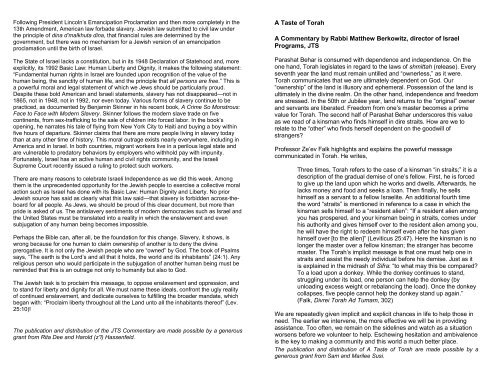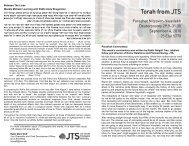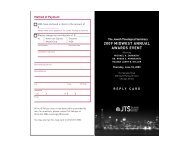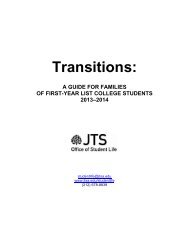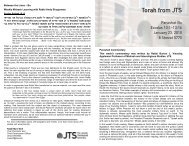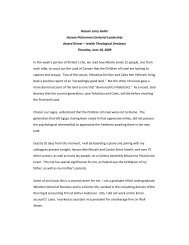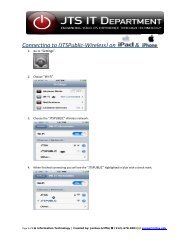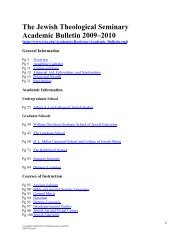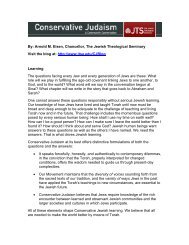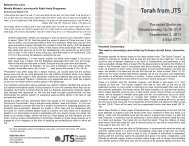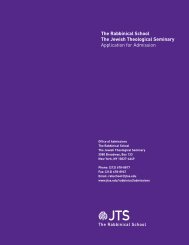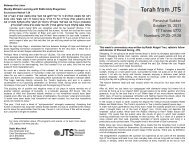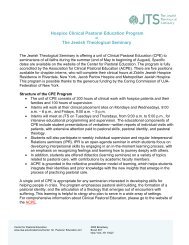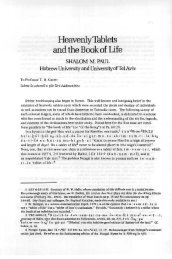Torah from JTS - The Jewish Theological Seminary
Torah from JTS - The Jewish Theological Seminary
Torah from JTS - The Jewish Theological Seminary
Create successful ePaper yourself
Turn your PDF publications into a flip-book with our unique Google optimized e-Paper software.
Following President Lincoln’s Emancipation Proclamation and then more completely in the<br />
13th Amendment, American law forbade slavery. <strong>Jewish</strong> law submitted to civil law under<br />
the principle of dina d’malkhuta dina, that financial rules are determined by the<br />
government, but there was no mechanism for a <strong>Jewish</strong> version of an emancipation<br />
proclamation until the birth of Israel.<br />
<strong>The</strong> State of Israel lacks a constitution, but in its 1948 Declaration of Statehood and, more<br />
explicitly, its 1992 Basic Law: Human Liberty and Dignity, it makes the following statement:<br />
“Fundamental human rights in Israel are founded upon recognition of the value of the<br />
human being, the sanctity of human life, and the principle that all persons are free.” This is<br />
a powerful moral and legal statement of which we Jews should be particularly proud.<br />
Despite these bold American and Israeli statements, slavery has not disappeared—not in<br />
1865, not in 1948, not in 1992, nor even today. Various forms of slavery continue to be<br />
practiced, as documented by Benjamin Skinner in his recent book, A Crime So Monstrous:<br />
Face to Face with Modern Slavery. Skinner follows the modern slave trade on five<br />
continents, <strong>from</strong> sex-trafficking to the sale of children into forced labor. In the book’s<br />
opening, he narrates his tale of flying <strong>from</strong> New York City to Haiti and buying a boy within<br />
five hours of departure. Skinner claims that there are more people living in slavery today<br />
than at any other time of history. This moral outrage exists nearly everywhere, including in<br />
America and in Israel. In both countries, migrant workers live in a perilous legal state and<br />
are vulnerable to predatory behaviors by employers who withhold pay with impunity.<br />
Fortunately, Israel has an active human and civil rights community, and the Israeli<br />
Supreme Court recently issued a ruling to protect such workers.<br />
<strong>The</strong>re are many reasons to celebrate Israeli Independence as we did this week. Among<br />
them is the unprecedented opportunity for the <strong>Jewish</strong> people to exercise a collective moral<br />
action such as Israel has done with its Basic Law: Human Dignity and Liberty. No prior<br />
<strong>Jewish</strong> source has said as clearly what this law said—that slavery is forbidden across-theboard<br />
for all people. As Jews, we should be proud of this clear document, but more than<br />
pride is asked of us. <strong>The</strong> antislavery sentiments of modern democracies such as Israel and<br />
the United States must be translated into a reality in which the enslavement and even<br />
subjugation of any human being becomes impossible.<br />
Perhaps the Bible can, after all, be the foundation for this change. Slavery, it shows, is<br />
wrong because for one human to claim ownership of another is to deny the divine<br />
prerogative. It is not only the <strong>Jewish</strong> people who are “owned” by God. <strong>The</strong> book of Psalms<br />
says, “<strong>The</strong> earth is the Lord’s and all that it holds, the world and its inhabitants” (24:1). Any<br />
religious person who would participate in the subjugation of another human being must be<br />
reminded that this is an outrage not only to humanity but also to God.<br />
<strong>The</strong> <strong>Jewish</strong> task is to proclaim this message, to oppose enslavement and oppression, and<br />
to stand for liberty and dignity for all. We must name these ideals, confront the ugly reality<br />
of continued enslavement, and dedicate ourselves to fulfilling the broader mandate, which<br />
began with: “Proclaim liberty throughout all the Land unto all the inhabitants thereof” (Lev.<br />
25:10)!<br />
<strong>The</strong> publication and distribution of the <strong>JTS</strong> Commentary are made possible by a generous<br />
grant <strong>from</strong> Rita Dee and Harold (z”l) Hassenfeld.<br />
A Taste of <strong>Torah</strong><br />
A Commentary by Rabbi Matthew Berkowitz, director of Israel<br />
Programs, <strong>JTS</strong><br />
Parashat Behar is consumed with dependence and independence. On the<br />
one hand, <strong>Torah</strong> legislates in regard to the laws of shmittah (release). Every<br />
seventh year the land must remain untilled and “ownerless,” as it were.<br />
<strong>Torah</strong> communicates that we are ultimately dependent on God. Our<br />
“ownership” of the land is illusory and ephemeral. Possession of the land is<br />
ultimately in the divine realm. On the other hand, independence and freedom<br />
are stressed. In the 50th or Jubilee year, land returns to the “original” owner<br />
and servants are liberated. Freedom <strong>from</strong> one’s master becomes a prime<br />
value for <strong>Torah</strong>. <strong>The</strong> second half of Parashat Behar underscores this value<br />
as we read of a kinsman who finds himself in dire straits. How are we to<br />
relate to the “other” who finds herself dependent on the goodwill of<br />
strangers?<br />
Professor Ze’ev Falk highlights and explains the powerful message<br />
communicated in <strong>Torah</strong>. He writes,<br />
Three times, <strong>Torah</strong> refers to the case of a kinsman “in straits;” it is a<br />
description of the gradual demise of one’s fellow. First, he is forced<br />
to give up the land upon which he works and dwells. Afterwards, he<br />
lacks money and food and seeks a loan. <strong>The</strong>n finally, he sells<br />
himself as a servant to a fellow Israelite. An additional fourth time<br />
the word “straits” is mentioned in reference to a case in which the<br />
kinsman sells himself to a “resident alien”: “If a resident alien among<br />
you has prospered, and your kinsman being in straits, comes under<br />
his authority and gives himself over to the resident alien among you,<br />
he will have the right to redeem himself even after he has given<br />
himself over [to the alien]” (Leviticus 25:47). Here the kinsman is no<br />
longer the master over a fellow kinsman; the stranger has become<br />
master. <strong>The</strong> <strong>Torah</strong>’s implicit message is that one must help one in<br />
straits and assist the needy individual before his demise. Just as it<br />
is explained in the midrash of Sifra: “to what may this be compared?<br />
To a load upon a donkey. While the donkey continues to stand,<br />
struggling under its load, one person can help the donkey (by<br />
unloading excess weight or rebalancing the load). Once the donkey<br />
collapses, five people cannot help the donkey stand up again.”<br />
(Falk, Divrei <strong>Torah</strong> Ad Tumam, 302)<br />
We are repeatedly given implicit and explicit chances in life to help those in<br />
need. <strong>The</strong> earlier we intervene, the more effective we will be in providing<br />
assistance. Too often, we remain on the sidelines and watch as a situation<br />
worsens before we volunteer to help. Eschewing hesitation and ambivalence<br />
is the key to making a community and this world a much better place.<br />
<strong>The</strong> publication and distribution of A Taste of <strong>Torah</strong> are made possible by a<br />
generous grant <strong>from</strong> Sam and Marilee Susi.


